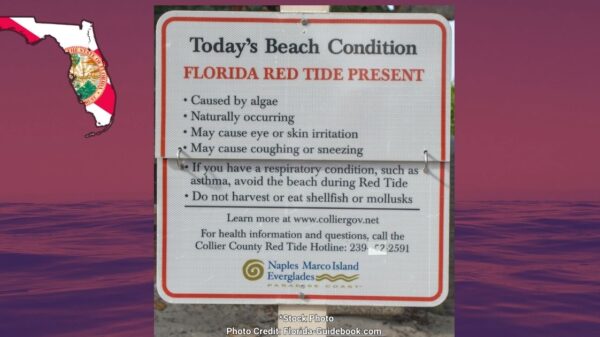After reports last week of red tide returning to Southwest Florida, U.S. Rep. Vern Buchanan, R-Fla., called on the U.S. Senate to do more to help combat the problem.
Buchanan has scored some wins on Capitol Hill to help in the fight against toxic algae and red tide. Back in June, Buchanan was able to get his proposal to have the federal government do more to study red tide and its impact on Americans’ health through the U.S. House when it passed his proposal having the National Institutes of Health (NIH) set aside $6.25 million to study red tide and toxic algae. Last year, Buchanan helped get $100 million from the federal government to fight red tide and toxic algae.
Buchanan wrote U.S. Senate Majority Leader Mitch McConnell, R-Ky., and U.S. Senate Appropriations Committee Chairman Richard Shelby, R-Ala., calling on them to pass his proposal to fund the NIH looking at how red tide impacts human health.
“We need to know how much of a threat red tide is to human health,” Buchanan said on Monday. “We know of the temporary physical discomfort it causes but we don’t know much beyond that. Now we need to find out if exposure presents a long-term threat to human health.”
Buchanan urged the senators “ to adopt House-passed language that prioritizes funding for a study into the long-term health threat posed by red tide and other harmful algal blooms” in the letter.
“These Harmful Algal Blooms (HABs) are occurring with increasing frequency and severity across the country,” Buchanan wrote. “We know of the temporary physical discomfort the toxic bacteria causes, but we don’t know much beyond that. We need to find out if exposure presents a long-term threat to human health. While short-term effects of red tide are well-documented, USA Today points out that ‘long-term data is scarce, a fact that is worrisome for scientists who study the organisms and doctors who are seeing patients ill from the blooms.’
“As you continue your work on funding the government for fiscal year 2020, I respectfully ask that you include language from my U.S. House passed amendment to prioritize research on the long-term health effects of red tide. Specifically, my amendment instructs the National Institute of Environment Health Sciences (NIEHS) to designate $6.25 million to research the long-term health effects of red tide and other Harmful Algal Blooms,” Buchanan added. “This issue is of particular concern in my home state of Florida which suffered one of the worst bouts of red tide in the state’s history last year. The bloom, which finally dissipated this past February, had plagued the coast for more than 15 months. And now red tide blooms have resurfaced in my own backyard off the coasts of Manatee, Sarasota, Collier and Lee Counties. People can become ill with Neurotoxic Shellfish Poisoning (NSP) or even die as a result of consuming contaminated shellfish that has been exposed to HAB toxins. People who swim in red tide while near the water can also suffer from severe respiratory issues, skin irritation and rashes. In one local case last year, a pregnant Siesta Key woman was suffering from health ailments and was forced to relocate from her home near the water.
“HABs are a growing national concern because of the widespread and lasting damage they cause not only to marine life and coastal ecosystems, but to our local economies as well. In fact, due to its impacts on public health, tourism, seafood and other related industries, HABs occurring in U.S. marine waters are estimated to cost the U.S. over $80 million a year,” he added. “And while we have some information on the impact of red tide, scientists and researchers still do not know the full extent of red tide’s harmful effects on human health. It is vital that we dedicate funding to discover how much of a threat red tide is to human health. Thank you for your consideration of this request, and for your attention to the issue.”
Reach Kevin Derby at kevin.derby@floridadaily.com.


















